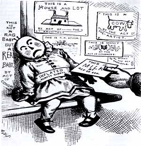| » Cover | ||
|
Reviews
We take language for granted, as we do siting and weeping. Unfamiliar speech we take for inarticulate gurgling. Filtered through sandbags. For Waldrop, the poetry than remains to us comes through such bricolage—the reconfiguring of those histories, arts, sciences, rubble, and body parts. Waldrop's blason is first of all the Renaissance poet's enumeration of his beloved's fair features, but it also evokes the heraldic coat of arms (one might also think of Achilles' shield). She translates both blasons into contemporary terms. What once denoted honor and power now displays our helplessness. For Waldrop, the poet can have no agenda, and what we might be tempted to call political critique has less to do with positions (even Chomskian ones) and everything to do with the nature of language, and its deep structures. Syntactical connections branch like neurons. Here, for instance, Eliot Weinberger's "What I learned in Iraq in 2005" (quoted in the first and third lines) takes a turn onto the street where Waldrop lives:
Trenches filled with trash. Sandbags filled with archaeological fragments. Men filled with fear. And again:
There used to be harbor where downtown Providence is, a pond full of perch under the civic center, Roger William's body under an apple tree. The poet does not need to tell us, any more than Princeton wrestler Donald Rumsfeld does in his collected poems: War, the Iraq war, is an assault on the origins of writing, the alphabet. Waldrop's "Babylon" is the central piece of an architectural whole—book and universe—governed by the powerlines of the book's first part. The energy that flows through the grid possesses its own quantum linguistic mechanics of identity and difference, taken up in the book's opening poem, "All Electrons are (Not) Alike." Electrons form bonds; electrons connect unlike elements; they are primal syntax. The wonders here recall Borges and Calvino, but we never lose sense of Waldrop's preoccupation with the bodily—or a poem's momentary place in the work's in/determinate structure.
The assumption is that the sirens have drowned in the alphabet. And been replaced by warnings, war, warp. My father's stopped reading to watch a magpie rising black and white against the sky. Memories are many. Glitter in the brain, ready to be pilfered. Does this fit my image of the real? Where the norms of social interaction have multiplied, and spontaneous acts come back as mistakes? Or combustion? Natural feeling, temperament, disposition, impulse, energy all lashed fast to the mast. The rubrics of the dictionary meaning business. Here as elsewhere in the book, we encounter this inevitable patriarch in the act of reading. He is the Great Reader—God as author being superfluous if not dead in our imperial world of consumption. And the Great Reader is drawn to the magpie, known for stealing bright things (Glitter in the brain, ready to be pilfered). If the sirens have drowned in the alphabet, then [t]he rubrics of the dictionary meaning business is the new siren call. Like War (and ultimately at one with it) Money is another easily accessed wrong turn. For Gertrude Stein, Money is always there but the pockets change; it is not in the same pockets after a change, and that is all there is to say about money. In "The One Who Counts, Who Paints, Who Buys and Sells," Waldrop stems from the same line:
It's no dream that when I now present a dollar bill to the U.S. Treasury I'm handed back a copy of the note and pulled up short and sharp by such tautology. Or a page of my writing to the court of experience? Flying money never lands. Flying money, empty semiosis. One might think of the Occupy Wall Street protestor with his banner proclaiming MONEY IS AN ILLUSION:
Not to surrender to appearance, implacable sign, mere shadow, licensed fraud. Who would, as in the cartoon of 1870, hand paper to a hungry baby. "This is by act of congress MILK." The Thomas Nast cartoon to which the poem refers is worth showing here as another blazon—
Waldrop's homage to John Cage, "Music is an Oversimplification of the Situation We Are In," is a precisely musical opening up of that situation through Cagean, stochastic method, doing to his Silence what he once did to Thoreau. We have a "constant connection to the past by the principle of form" and "a toss of coins." "At any point, along any line or curve one has a choice." One gets the sense that he is Vergil to her Dante, showing a way through the horrors around her. Driven to Abstraction maps the last decade unlike any other work this reviewer knows, or say rather than it embodies what we have been through; for this book is a traumatized body: If I try to say the whole thing in one sentence I say the same thing over and over. And again: My writing is nothing but a stutter. Or: Skin, though it takes pains to remember caresses, is marked by the roads that pain takes. To the extent that such psycholinguistic insight presents the possibility of cure, Waldrop's poetry offers that as well. We, after all, are the abstraction to which she is driven, and which she makes flesh.
|
|||||

